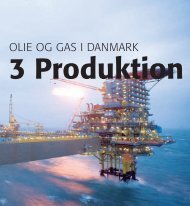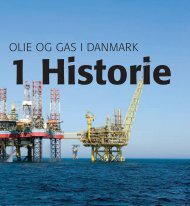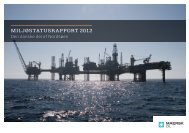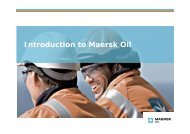Environmental statement - Flyndre and Cawdor - Maersk Oil
Environmental statement - Flyndre and Cawdor - Maersk Oil
Environmental statement - Flyndre and Cawdor - Maersk Oil
You also want an ePaper? Increase the reach of your titles
YUMPU automatically turns print PDFs into web optimized ePapers that Google loves.
<strong>Flyndre</strong> <strong>and</strong> <strong>Cawdor</strong> <strong>Environmental</strong> Statement<br />
Appendix A - Register of <strong>Environmental</strong> Legislation<br />
Vessels<br />
Issue Legislation Regulator <strong>and</strong> Requirements<br />
Rock dumping <strong>and</strong><br />
other deposits of<br />
the seabed<br />
Fisheries liaison<br />
Machinery space<br />
drainage from<br />
shipping<br />
The Petroleum Act 1998 Regulators: DECC supported by Marine Scotl<strong>and</strong> <strong>and</strong> CEFAS <strong>and</strong> within territorial waters Scottish Government Marine Directorate<br />
Model Clauses of Licence<br />
HSE Offshore Safety Division Operations<br />
Notice 3<br />
The Merchant Shipping (Prevention of <strong>Oil</strong><br />
Pollution) Regulations 1996 ( as amended<br />
2000 <strong>and</strong> 2005) (as amended by the Merchant<br />
Shipping (Implementation of Ship‐Source<br />
Pollution Directive) Regulations 2009)<br />
Deposits in the sea were regulated through the MCAA but, as a result of the Petroleum Act 1998 this does not apply to anything done:<br />
(a) for the purpose of constructing a pipeline as respects any part of which an authorisation (within the meaning of Part III of the<br />
Petroleum Act 1998) is in force; or<br />
(b) for the purpose of establishing or maintaining an offshore installation within the meaning of Part IV of that Act.<br />
The equivalent of the DEPCON (deposition consent) required under the Petroleum Act 1998 for these activities is incorporated within<br />
the PWA process. Similarly, the DISCON (discharge consents) required under the Act is incorporated within the PON 15 process.<br />
However, a licence is required for “the deposit, by means of seabed injection, of material arising from offshore hydrocarbon exploration<br />
<strong>and</strong> production operations” <strong>and</strong> for deposits of rock, mattresses etc (excluding rig stabilisation)<br />
Regulator: DECC<br />
From the 7 th <strong>and</strong> 8 th Licensing rounds onwards, operators have been required to appoint a Fisheries Liaison Officer to liaise with the<br />
fishing industry <strong>and</strong> Government Fisheries Departments on exploration <strong>and</strong> production activities.<br />
HSE Offshore Safety Division Operations Notice 3, Liaison with Other Bodies, June 2008 outlines liaison routes to improve<br />
communication between operators <strong>and</strong> other users of the sea <strong>and</strong> includes a requirement for a Fisheries Liaison.<br />
Regulator: Maritime <strong>and</strong> Coastguards Agency<br />
These regulations implement MARPOL Annex I (Prevention of Pollution by <strong>Oil</strong>) into UK legislation.<br />
Within a ‘Special Area’ ships which are 400GT or above can discharge water from machinery space drainage providing the oil content of<br />
the water does not exceed 15ppm. Vessels must be equipped with oil filtering systems; automatic cut offs <strong>and</strong> oil retention systems. All<br />
vessels must hold an approved Shipboard <strong>Oil</strong> Pollution Emergency Plan (SOPEP) <strong>and</strong> must maintain a current <strong>Oil</strong> Record Book <strong>and</strong> the<br />
ship must be proceeding on its voyage.<br />
All vessels must hold a UKOOP certificate or an IOPC certificate for foreign ships. Installations can obtain a temporary exception from<br />
MCA under an informal agreement between the UKO&G <strong>and</strong> the MCA, however new installations need to demonstrate their<br />
‘equivalence’ to other offshore installations where temporary installations are being issued <strong>and</strong> they are unlikely to obtain a certificate<br />
unless they fully comply with the requirements. Note, if all machinery drainage is routed via the hazardous or non‐hazardous drainage<br />
systems this will fall under OPPC <strong>and</strong> not require a UKOOP certificate.<br />
MARPOL 73/78 also defines a ship to include "floating craft <strong>and</strong> fixed or floating platforms" <strong>and</strong> these are required where appropriate to<br />
comply with the requirements similar to those set out for vessels.<br />
The amendments made under the Merchant Shipping (Implementation of Ship‐Source Pollution Directive) Regulations 2009 close an<br />
D/4114/2011 A ‐ 11








